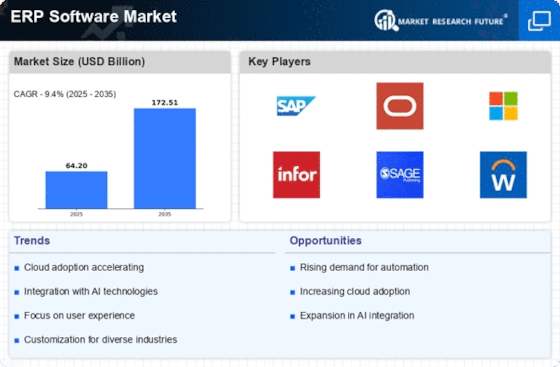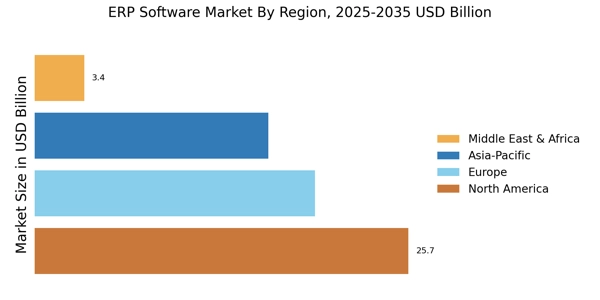The ERP Software Market is currently experiencing a transformative phase characterized by rapid technological advancements and evolving business needs. Advanced enterprise resource planning ERP software is increasingly embedded with AI, analytics, and automation capabilities. Each enterprise resource planning ERP system supports centralized control of finance, operations, and human capital management. Modern enterprise resource planning ERP systems are evolving toward modular, cloud-native architectures.
Effective enterprise resource management is driving demand for integrated ERP platforms across industries. An advanced enterprise resource management system enables organizations to optimize workflows and improve decision-making accuracy. Organizations are increasingly recognizing the necessity of integrated solutions that streamline operations, enhance productivity, and facilitate data-driven decision-making. As companies strive for greater efficiency, the demand for cloud-based ERP systems is on the rise, offering flexibility and scalability that traditional on-premise solutions often lack. Furthermore, the integration of artificial intelligence and machine learning into ERP systems is reshaping functionalities, enabling predictive analytics and automation that can significantly improve operational workflows.
Modern ERP system software incorporates artificial intelligence and predictive analytics to enhance business performance. The adoption of ERP computer software is expanding rapidly across manufacturing, retail, and healthcare sectors. Advanced resource planning software supports enterprises in optimizing financial management and supply chain operations. The demand for manufacturing ERP software is increasing as producers seek real-time production planning and inventory optimization. In addition to technological innovations, the ERP Software Market is witnessing a shift towards industry-specific solutions. Businesses are seeking tailored applications that address unique challenges within their sectors, leading to a proliferation of niche ERP offerings. This trend suggests a move away from one-size-fits-all solutions, as organizations prioritize customization and adaptability.
Moreover, the emphasis on user experience and intuitive interfaces is becoming increasingly prominent, as companies aim to enhance employee engagement and reduce training time. Overall, the ERP Software Market appears poised for continued growth, driven by these dynamic trends and the ongoing pursuit of operational excellence. Demand for enterprise resource planning software is rising as enterprises seek centralized systems for finance, supply chain, and human resources management. Each modern enterprise resource planning system integrates multiple business functions to improve operational efficiency and data accuracy. Cloud-based enterprise resource planning systems are gaining popularity due to scalability, flexibility, and lower infrastructure costs. Industry-specific enterprise resource planning solutions are increasingly preferred as organizations seek customized operational capabilities.
Cloud Adoption
The shift towards cloud-based ERP solutions is gaining momentum, as organizations seek flexibility and scalability. Cloud systems allow for easier updates and remote access, which enhances collaboration and efficiency. The adoption of cloud-based enterprise resource planning platforms is accelerating as organizations prioritize scalability and remote accessibility. Cloud enterprise resource planning enables real-time data access and seamless collaboration across distributed business environments. Enterprise resource planning ERP platforms form the backbone of modern enterprise digital transformation strategies. ERP enterprise resource planning solutions integrate core business processes into a unified digital platform.
Industry-Specific Solutions
There is a growing demand for ERP systems tailored to specific industries. Companies are increasingly looking for solutions that address their unique operational challenges, leading to the development of specialized applications.
Integration of AI and Automation
The incorporation of artificial intelligence and automation into ERP systems is transforming how businesses operate. These technologies enable predictive analytics and streamline processes, enhancing overall productivity.

















